Planning worship?
Check out our sister site, ZeteoSearch.org,
for 20+ additional resources related to your search.
- |
User Links
Person Results
William M. Reynolds
1812 - 1876 Person Name: William Reynolds, 1812-1875 Topics: Advent IV A; Advent IV C Translator (sts. 1-3a) of "Savior of the Nations, Come" in Worship (4th ed.) Born: March 4, 1812, Fayette County, Pennsylvania.
Died: September 5, 1876, Oak Park, Illinois.
Reynolds was educated at Jefferson College, Canonsburg, Pennsylvania, and Lutheran Gettysburg Seminary. He was a professor at Pennsylvania College (1833-50); president of Capital University, Columbus, Ohio (1850-53); and president of Illinois State University (1857-60). He became an ordained Episcopal minister in 1864, and founded the Evangelical Review. His last pastorate was at Christ Church, Harlem (Oak Park), Illinois, from 1872 until his death.
Lyrics--
Come, Thou Savior of Our Race
Come, Thou Soul Transforming Spirit
Eternity, Terrific Word
Jesus, My Lord, Thy Nearness Does Impart
Lord Jesus Christ, to Thee We Pray
O God, Look Down from Heaven, We Pray
O Holy Ghost, Descend We Pray
O Lord, Uphold Us by Thy Word
O Lord, We Would Praise Thee
Rejoice, Ye Ransomed of the Lord
Translations--
"Savior of the Nations, Come"
---www.hymntime.com/tch
William M. Reynolds
David McK. Williams
1887 - 1978 Topics: Advent IV The Holy Communion In place of Gloria Composer of "MALABAR" in The Hymnal of the Protestant Episcopal Church in the United States of America 1940 David McKinley Williams (Conductor)
Born: February 20, 1887 - Carnarvonshire, Wales, UK
Died: March 13, 1978 - Oakland, California, USA
The Welsh-born American church musician, composer, and teacher, David McKinley Williams, began his career in church music as a chorister in the choir of the Cathedral of St. John, Denver. At the age of 13 he became the organist of St. Peter's Church, Denver.
In 1908 David McKinley Williams went to New York to serve as the organist of Grace Church Chapel. He moved to Paris in 1911 for study with some of the best known French organists of the time. Upon his return, he served as organist of the Church of the Holy Communion in New York. He served in the Royal Canadian Artillery in World War I and returned to his New York position in 1920. After only six months, he was appointed organist and choirmaster of St. Bartholomew's Church, New York. He held this position until his retirement in 1947.
David McKinley Williams developed one of the most outstanding music programs in the USA at St. Bartholomew's. He was head of the organ department of the Juilliard School of Music and a member of the faculty of the School of Sacred Music, Union Theological Seminary. He also served as a member of the Joint Commission on Church Music and the Joint Commission on the Revision of the Hymnal that produced The Hymnal (1940). The Hymnal 1982 uses five of his tunes, including MALABAR used with "Strengthen for Service" (Hymn 312), CANTICUM REFECTIONIS, used with "This is the hour of banquet and of song" (Hymn 316), and GEORGETOWN, used with "They cast their nets in Galilee" (Hymn 661).
Source: The Episcopal Church - Liturgy Music Website
David McK. Williams
Winfred Douglas
1867 - 1944 Person Name: W. D. Topics: Morning; Epiphany IV Morning Prayer Opening; God In nature; Stewardship; Sunday next before Advent Morning Prayer Opening; Trinity V Morning Prayer Opening; Zeal Harmonizer of "MORNING SONG" in The Hymnal of the Protestant Episcopal Church in the United States of America 1940 Charles Winfred Douglas (b. Oswego, NY, 1867; d. Santa Rosa, CA, 1944), an influential leader in Episcopalian liturgical and musical life. Educated at Syracuse University and St. Andrews Divinity School, Syracuse, New York, he moved to Colorado for his health. There he studied at St. Matthew's Hall, Denver, and founded the Mission of the Transfiguration in Evergreen (1897). Ordained a priest in the Episcopal Church in 1899, he also studied in France, Germany and England, where he spent time with the Benedictines of Solesmes on the Island of Wight from 1903 to 1906. For much of his life, Douglas served as director of music at the Community of St. Mary in Peekskill, New York, and had associations with cathedrals in Denver, Colorado, and Fond du Lac, Wisconsin. He promoted chanting and plainsong in the Episcopal Church through workshops and publications such as The American Psalter (1929), the Plainsong Psalter (1932), and the Monastic Diurnal (1932). His writings include program notes for the Denver Symphony Orchestra, various hymn preludes; organ, as well as the book, Church Music in History and Practice (1937). He was editor of both the Hymnal 1916 and its significant successor, Hymnal 1940, of the Episcopal Church. Douglas's other achievements include a thorough knowledge of the life and culture of Hopi and Navajo natives, among whom he lived for a number of years.
Bert Polman
Winfred Douglas
Martin Shaw

1875 - 1958 Person Name: Martin Shaw, 1875-1958 Topics: Advent IV Year A; Advent IV Year C Harmonizer of "BESANÇON" in Common Praise Martin F. Shaw was educated at the Royal College of Music in London and was organist and choirmaster at St. Mary's, Primrose Hill (1908-1920), St. Martin's in the Fields (1920-1924), and the Eccleston Guild House (1924-1935). From 1935 to 1945 he served as music director for the diocese of Chelmsford. He established the Purcell Operatic Society and was a founder of the Plainsong and Medieval Society and what later became the Royal Society of Church Music.
Author of The Principles of English Church Music Composition (1921), Shaw was a notable reformer of English church music. He worked with Percy Dearmer (his rector at St. Mary's in Primrose Hill); Ralph Vaughan Williams, and his brother Geoffrey Shaw in publishing hymnals such as Songs of Praise (1925, 1931) and the Oxford Book of Carols (1928). A leader in the revival of English opera and folk music scholarship, Shaw composed some one hundred songs as well as anthems and service music; some of his best hymn tunes were published in his Additional Tunes in Use at St. Mary's (1915).
Bert Polman
Martin Shaw
William Boyce

1711 - 1779 Person Name: William Boyce, 1711-1779 Topics: Advent IV Year A; Advent IV Year C Composer of "HALTON HOLGATE" in Common Praise William Boyce (baptised 1711 – d. 7 February 1779) was an English composer and organist.
See also in:
Wikipedia
William Boyce
Christopher Smart
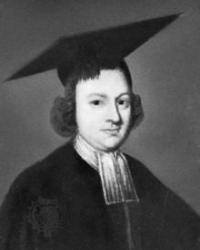
1722 - 1771 Person Name: Christopher Smart, 1722-1771 Topics: Advent IV Year A; Advent IV Year C Author of "Where is this stupendous stranger?" in Common Praise Smart, Christophe, M.A., was born at Shipburn, Kent, in 1722, and educated at Pembroke Hall, Cambridge, where he gained the Seatonian prize for five years, four of which were in succession, (B.A. 1747.) He removed to London in 1753, and gave some attention to literature: but neglecting both his property and his constitution, he became poor and insane. He died in the King's Bench, 1771. His Poems were published in 2 vols. in 1771. From that work "Father of light conduct my feet" (Divine Guidance), and "I sing of God the mighty Source" [God the Author of All), have been taken.
--John Julian, Dictionary of Hymnology (1907)
Christopher Smart
Geoffrey Anketel Studdert Kennedy
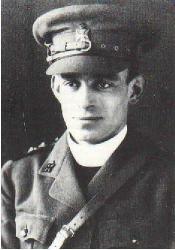
1883 - 1929 Person Name: Geoffrey Abjetekk Studdert-Kennedy Topics: Morning; Epiphany IV Morning Prayer Opening; God In nature; Stewardship; Sunday next before Advent Morning Prayer Opening; Trinity V Morning Prayer Opening; Zeal Author of "Awake, awake to love and work!" in The Hymnal of the Protestant Episcopal Church in the United States of America 1940 Born with Irish heritage to the vicarage in a deprived parish in Leeds. Studdert Kennedy got into Trinity College Dublin at the age of 14, though poverty meant he did not attend until later, graduating with a First Class degree. He was a popular teacher at Calday Grange Grammar School on the Wirral Peninsula before entering the Anglican Ministry; ordained in Worcester Cathedral in 1908 and married in 1914. He worked in deprived parishes: in Rugby, with his Father in Leeds and St Paul's in Worcester. He was known for his forgetfulness, his generosity (he famously gave away the marital bed to an old lady in need recruiting his wife to help carry the mattress) and his plain speaking.
He became a military chaplain (AKA the Padre) in 1915. He spent time with the men waiting to go to the Front speaking with them and offering to write letters home. He carried a large canvas sack of New Testaments and Woodbine Cigarettes to distribute, often staying on the trains up to the front well after they had left the station earning great popularity and the affectionate nickname Woodbine Willie. In 1917 he was awarded the Military Cross for fetching morphine for a first aid post on the Front while under bombardment and repeatedly going to help the wounded or bury the dead in No Man's Land. During the war his first collection of poetry "Rough Rhymes of a Padre" was published and he achieved widespread national fame. His poems did not shy from the horrors of war or questions of faith raised. He was always on the side of the 'ordinary man'.
After the war he continued in parish ministry before taking an itinerant role with the Industrial Christian Fellowship (still operating) where he proclaimed the gospel and fought for the disadvantaged. He died in Liverpool 1929 intending to keep a commitment despite exhaustion. His memorial in Worcester Cathedral says "A poet: a prophet: a passionate seeker after truth: an ardent advocate of Christian fellowship." His hymns are taken from his collections of verse later anthologised in The Unutterable Beauty (1927).
David L. Gent
Geoffrey Anketel Studdert Kennedy
W. J. Sparrow-Simpson
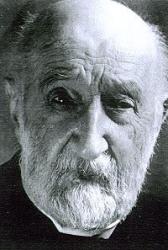
1859 - 1952 Person Name: W. J. Sparrow-Simpson, 1859-1952 Topics: Holy Communion; Advent I Year B; Lent IV Year C; Proper 25 Year B Author of "All for Jesus, all for Jesus" in Common Praise Simpson, William John Sparrow, M.A., was educated at Trin. College, Camb., B.A. 1882, M.A. 1886. Ordained in 1882, he held various appointments until 1904, when he became Chaplain to St. Mary's Hospital, Great Ilford. He has published several works, including a Memoir of Dr. W. S. Simpson, 1899. He contributed "All for Jesus—all for Jesus" (All for Jesus), and "Jesus, the Crucified, prays for me" (Passiontide), to C. W. A. Brooke's Additional Hymns, 1901). These hymns originally appeared in Sir J. Stainer's cantata The Crucifixion, 1887, the book of words of which was compiled by Mr. Simpson.
--John Julian, Dictionary of Hymnology, New Supplement (1907)
W. J. Sparrow-Simpson
Kevin Keil
b. 1965 Topics: Advent IV Author of "Psalm 24: We Long to See Your Face" in Gather Comprehensive
Kevin Keil
Edgar Pettman
1886 - 1943 Person Name: Edgar Pettman, 1865-1943 Topics: Advent IV Year B Arranger of "GABRIEL'S MESSAGE" in Common Praise
Edgar Pettman
John Julian
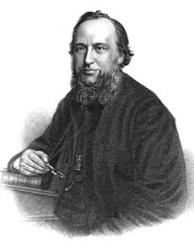
1839 - 1913 Topics: Advent IV Evening Prayer Opening Author of "High in regal glory" in The Hymnal of the Protestant Episcopal Church in the United States of America 1940 Born: January 27, 1839, St. Agnes, Cornwall.
Died: January 22, 1913, Thirsk, Yorkshire, England.
Educated privately, Julian graduated from Durham University (MA 1887), Lambeth (DD 1894), and Howard University in Washington, DC (LLD 1894). He took Holy Orders in 1866, and served as Vicar of Wincobank (1876-1905) and Vicar of Topcliff, Yorkshire (1905-). However, he is best known as a hymnologist. The standard reference work in this field is his massive Dictionary of Hymnology: Origin and History of Christian Hymns and Hymnwriters of All Ages and Nations, Together with Biographical and Critical Notices of Their Authors and Translators. This work has been revised and reprinted several times; its publication dates include:
-- London: J. Murray, 1892
-- London: J. Murray, 1908 (this may be the edition revised by James Mearns (1855-1922), Vicar of Rushden, Hertfordshire)
--Grand Rapids, Michigan: Kregel Publications, 1985
His other works include:
Concerning Hymns, 1874
History of the Use of Hymns in Public Worship, and Their Proper Characteristics, 1894
Carols, Ancient and Modern, 1900
Julian donated his large collection of hymnological books and manuscripts to the Church House, Dean’s Yard, London, where it formed the hymnological department of the library.
www.hymntime.com/tch
John Julian
Michael Fleming
1928 - 2006 Person Name: Michael Fleming, b. 1928 Topics: Advent IV Year B Composer of "WELLINGTON" in Common Praise
Michael Fleming
Patricia B Clark
1938 - 2009 Person Name: Patricia Blaze Clark, 1938-2009 Topics: Advent IV C Author of "When, to Mary, the Word" in Worship (4th ed.)
Patricia B Clark
Charles William Humphreys
1840 - 1921 Person Name: C. W. Humphreys Topics: Advent IV The Holy Communion In place of Gloria Translator of "Strengthen for service, Lord, the hands" in The Hymnal of the Protestant Episcopal Church in the United States of America 1940
Charles William Humphreys
Jeannette M. Lindholm
b. 1961 Person Name: Jeannette M. Lindholm, b. 1961 Topics: Advent IV B Author of "Unexpected and Mysterious" in Worship (4th ed.)
Jeannette M. Lindholm
Ahasuer Fritsch
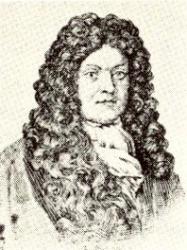
1629 - 1701 Person Name: A. Fritsch, 1679 Topics: Advent I Year A; Sunday Next Before Lent; Lent IV Year A; Proper 20 Year C; Unity Composer of "DARMSTADT" in Common Praise Born: December 16, 1629, Mücheln, Saxony.
Died: August 24, 1701, Rudolstadt, Germany.
With help from the family of a young noble he tutored, Fritsch received a good education, earning his law degree from the University of Jena in 1661. He later became chancellor of the university and president of the Consistory of Rudolstadt. He wrote on numerous subjects, including antiquities, law, and religion, and collected hymns.
Hymns--
"Liebster Immanuel, Herzog der Frommen"
"Dearest Immanuel, Prince of the Lowly"
Music--
WAS FRAG' ICH NACH DER WELT
--www.cyberhymnal.org/bio
Ahasuer Fritsch
Jack W. Burnam
b. 1946 Person Name: Jack W. Burnam, b. 1946 Topics: Advent IV C Harmonizer of "MIDDLEBURY" in Worship (4th ed.)
Jack W. Burnam
Bryan Kelly
b. 1934 Person Name: Bryan Kelly, b. 1934 Topics: Advent IV Year A; Advent IV Year C Composer of "CASTIGLIONE" in Common Praise
Bryan Kelly
R. B. Y. Scott
1899 - 1987 Topics: Advent; National Days; God Purpose of; Peace International; Social Religion War and peace; Trinity IV The Holy Communion General Author of "O Day of God, draw nigh" in The Hymnal of the Protestant Episcopal Church in the United States of America 1940 Scott, Robert Balgarnie Young. (Toronto, Ontario, July 18, 1899--November 1, 1987). United Church. University of Toronto, B.A., 1922; M.A., 1924; Ph.D., 1928. Pastorate at Long Branch, Ont., 1926-1928; professor of Old Testament at Union College (Vancouver), 1928-1931; United Theological College (Montreal), 1931-1955; Princeton University, 1955-1968; also dean of divinity at McGill University (Montreal), 1945-1955. Published many translations of, and commentaries on, Old Testament material, as well as on the Dead Sea Scrolls. Most of his hymns date from his years in Montreal.
--Hugh D. McKellar, DNAH Archives
R. B. Y. Scott
Gerard Francis Cobb
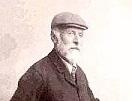
1838 - 1904 Person Name: Gerard F. Cobb, 1838-1904 Topics: Advent; Saints' Days and Holy Days St. Matthew; Evangelists; Easter IV The Holy Communion Sequence; Holy Scriptures; St. John Evangelsit The Holy Communion Sequence; St. Luke Morning Prayer Closing; St. Matthias The Communion Opening; Trinity XI The Holy Communion Sequence Composer of "COBB" in The Hymnal of the Protestant Episcopal Church in the United States of America 1940 Gerard Francis Cobb was born at Nettlestead (near Maidstone), Kent, on 15 October 1838, the youngest of five children of the Reverend William Francis Cobb (1795-1862) - the rector of Nettlestead - and his wife, Mary Blackburn. The five children were:- 1. Mary (1826-1906), 2. Clement Francis (1821-1896), 3. William Francis (1831-1916), 4. Francis (1834-1920), and 5. Gerard Francis (1838-1904). (The patronymic ‘Francis' occurs in several generations. Gerard's grandfather was Francis Cobb (1759-1831), a brewer and banker of Margate, whose sons were William Francis (Gerard's father), John Francis and Thomas Francis. Gerard's brother Clement also had a son Francis William (1872-1938). The parents were both musical, the mother being a pianist (and latterly organist at Nettlestead) and the father a ’cellist. Gerard early showed an aptitude for music and was able to pick out a tune on the piano while still a child, and without any formal instruction.
Gerard Francis Cobb was educated at Marlborough College from 1849 to 1857. (His brothers William and Clement were also educated there.) He was a bright pupil, reaching the Sixth Form in September 1854 (still aged 15) and winning several prizes - the Divinity Prize (Summer 1853), the Upper Fifth Prize (Summer 1854), the Lower Sixth Prize (Christmas 1854) and the English Essay Prize (1856). He was also appointed a College Prefect and (when he left school) donated a cup as an inter-house singing trophy. (Inter-house singing competitions continue to be popular at Marlborough to this day.) Two concert programmes from Marlborough College (Christmas 1854 and Christmas 1856) show his active involvement as singer, pianist and harmonium player, although in neither programme is there any indication of a composition by him.
From Marlborough Cobb went up to Trinity College, Cambridge, matriculating in 1857. He was elected a Scholar in 1860, and graduated B.A. in 1861 with a double first in the Classical and Moral Science Triposes. He then went to Dresden for a short time, to study music. While there, he perfected his knowledge of German, later providing English translations for three of the texts of his own Lieder und Gesang (1885); he was also proficient in French and Italian, as well as being an excellent classical scholar. (Cobb wrote the words of at least one of his own songs - "Reconciliation" (c.1891) - and inserted a verse of his own into another song - "Drawbacks" (1892), words by Henry S. Leigh.)
It may have been at this time that he decided not to make music his profession: he returned to Cambridge, where he spent the rest of his life. He was elected a Fellow of Trinity in 1863, proceeding M.A. in 1864, and in 1869 was appointed Junior Bursar of his college. This office, which he held for twenty-five years and in which he showed great business capacity, seems to have centered around the day-to-day running of the college, which included looking after the accommodation of some six hundred students (Trinity was the largest of all the Oxbridge colleges) and even making sure that the brewery horse had the correct number of nails in his shoes! (The college had a small brewery).
Cobb's interests were many and varied. There was music, of course, but (appropriately, as the son, brother and uncle of rectors) he was also much interested in Church matters: he was in sympathy with the Tractarian movement (associated with Newman, Pusey, Keble, Forbes and Froude) and at one time contemplated (but finally declined) holy orders. He actively advocated union between the Anglican and Roman communities, and published an elaborate treatise which caused a sensation in ecclesiastical circles. A second edition (with a sequel) followed and this, in turn, was followed by two short tracts. Even as late as the 1860s there was a form of religious intolerance which although not life-threatening (as in the reigns of earlier monarchs) nevertheless ensured that a career in the Church would no longer be an option for Cobb. His appointment at Trinity was timely, and his energies were then directed towards the running of the College and to the pursuit of music.
Cobb was a fine organist, and gave occasional recitals at Trinity. His writings include a history of the organ and an account of the choir which, apparently, he also trained. He was, too, the University’s representative on municipal affairs and produced pamphlets on rather more mundane matters than were normally dealt with in "the olive-grove of Academe".
When Cobb went up to Trinity in 1857 the Professor of Music was the recently appointed (1856) William Sterndale Bennett (1816-1875). Cobb enjoyed Bennett's friendship and was helpful to him in dealing with the Faculty of Music. In the last years of his life, Bennett made use of two bound octavo music note-books in which he jotted down sketches and ideas; these books had been brought to him from Germany by Cobb.
On Bennett's death, the Professorship passed to the blind George Macfarren (1813-1887). Cobb proved equally helpful to the new incumbent, particularly in the reform of the Faculty. He had been elected President of the Cambridge University Musical Society in 1874 and became Chairman of the University Board of Musical Studies in 1877, serving in that capacity for fifteen years.
Aside from his work at Trinity, and his musical, religious, and municipal interests, there is yet one more facet of this Victorian polymath which must command our attention. He was, perhaps surprisingly, a great lover of outdoor activities - swimming, walking, hill climbing, and - above all - cycling. He was one of the founders - and first President (1878) - of the National Cyclists' Union (originally the Bicycle Union) and was also President of the Cambridge University Cycling Club. For the International Health Exhibition (1884) he contributed a chapter on 'Cycling' to the handbook on athletics, part 11.
Cobb thought so much of cycling that his enthusiasm induced not only undergraduates but even many of the Dons to take to it (33). He celebrated his sixtieth birthday by undertaking a cycle run of sixty miles in company with one of his nephews. Cobb was not very tall and was almost equalled in height by his earlier high cycle, although in later years he rode what was then called a 'safety cycle' (which was smaller) and, eventually a 'free wheel bicycle'. (The cycle which features in the accompanying photograph is presumably a 'safety' or 'free wheel' machine.)
Little is known of Cobb's life outside Cambridge. His duties at Trinity would have kept him there for most of the year, and his dealings with his London publishers were probably conducted by letter. His name appears on the invitation lists of several of the Royal Society of Musicians' annual dinners in the 1880s and, although he did not attend any of these, he is recorded as having made several donations to the Society.
In 1893 Cobb married Elizabeth Lucy Parkinson, widow of Stephen Parkinson, Fellow and Tutor of St. John’s College, Cambridge, and (in accordance with the custom of the time) resigned his offices at Trinity. He continued to reside in Cambridge - at The Hermitage Silver Street - and devoted himself mainly to musical composition. From this last period of his life came the second (1893) and third (1897) sets of Barrack-Room Ballads (the first having appeared in 1892) and his delightful Twenty-four Songs for Little People (1897) to words by Norman Gale (d. 1942), as well as works on a larger canvas, including his most ambitious work - A Song of Trafalgar Op. 41, a Ballad for men's voices (solo and chorus) and orchestra (1900), to words by Edith Nesbit (1858-1924) - remembered today as the author of The Railway Children (1906).
Among Cobb's large-scale works is reputed to be a Symphony although no trace of this has yet come to light. What can be stated with certainty, however, is that on 27 November 1902 a concert was held at the Winter Gardens, Bournemouth, given by the Municipal Orchestra under the direction of Dan Godfrey, jun. - later Sir Dan Godfrey (1868-1939) - and Gerard Cobb, who conducted "For the first time in Bournemouth" (and probably the first time anywhere) three of his own works - Introduction and Allegro Giocoso in B flat, Valse Pathétique 'Niobe', and Romanza for Orchestra, in E flat (performed at a Prom in 1901); two of Cobb's earlier songs - "I wish to tune my quivering lyre" (written in 1868) and "Mount, Gallants all!" (published c.1890 were sung by Henry Corner. (An orchestral score and band parts for "Mount, Gallants all!" were available for hire from the publishers, and it must be assumed that both songs were given with orchestral accompaniment.)
Cobb's last-known compositions were three further settings of poems by Kipling - not from the Barrack-Room Ballads this time, but from a similar collection, Service Songs. The three songs. - "M.I." (Mounted Infantry of the Line), "The Married Man" (Reservist of the Line), and "Lichtenberg" (New South Wales Contingent) - had been commissioned by Charles Sheard, who had published his settings of the Barrack-Room Ballads and they were completed just a few days before his death. Sheard published them later that year.
Gerard Francis Cobb died at The Hermitage on 31 March 1904. having succumbed to an attack of pneumonia. He was cremated at Woking on 5 April at 12.00 noon, at which precise time a memorial service was held at Trinity College Chapel; the music was all by Cobb. His ashes were laid to rest on 8 April in the churchyard at Nettlestead, where his widow erected a handsome cross in his memory.
http://www.musicweb-international.com/classrev/2004/oct04
Gerard Francis Cobb
James Hopkirk
1908 - 1972 Person Name: James Hopkirk Topics: Advent; National Days; God Purpose of; Peace International; Social Religion War and peace; Trinity IV The Holy Communion General Composer of "BELLWOODS" in The Hymnal of the Protestant Episcopal Church in the United States of America 1940
James Hopkirk


 My Starred Hymns
My Starred Hymns


